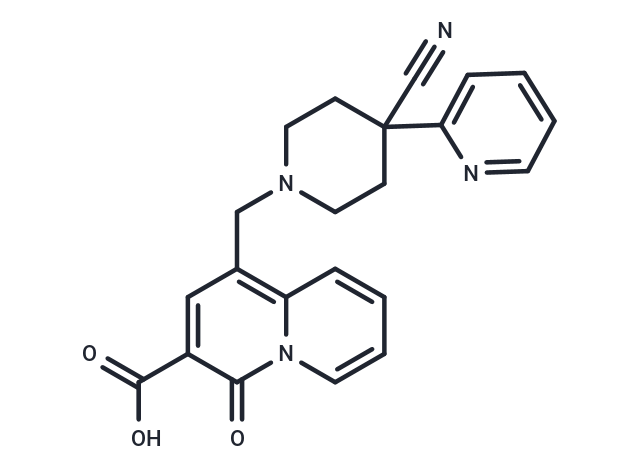Shopping Cart
Remove All Your shopping cart is currently empty
Your shopping cart is currently empty
PQCA is a muscarinic M1 receptor-positive allosteric regulator, which is highly selective and effective. PQCA exhibited EC50 values of 49 nM in rhesus monkey and 135 nM in human M1 receptors, but showed no activity against other muscarinic receptors. PQCA is a potential compound for reducing cognitive deficits associated with Alzheimer's disease.

| Pack Size | Price | USA Warehouse | Global Warehouse | Quantity |
|---|---|---|---|---|
| 1 mg | $47 | In Stock | In Stock | |
| 5 mg | $118 | In Stock | In Stock | |
| 10 mg | $202 | In Stock | In Stock | |
| 25 mg | $320 | In Stock | In Stock | |
| 50 mg | $443 | In Stock | In Stock | |
| 100 mg | $589 | In Stock | In Stock |
| Description | PQCA is a muscarinic M1 receptor-positive allosteric regulator, which is highly selective and effective. PQCA exhibited EC50 values of 49 nM in rhesus monkey and 135 nM in human M1 receptors, but showed no activity against other muscarinic receptors. PQCA is a potential compound for reducing cognitive deficits associated with Alzheimer's disease. |
| Targets&IC50 | M1 mAChR (human):135 nM (EC50), M1 mAChR (human):135 nM (EC50), M1 mAChR (rhesus):49 nM (EC50), M1 mAChR (rhesus):49 nM (EC50) |
| In vivo | In male rhesus monkeys, oral administration of PQCA (3-30 mg/kg) effectively mitigates the cognitive impairments induced by scopolamine in both the paired-associates learning (PAL) and the continuous performance task (CPT). Scopolamine-induced blockade of muscarinic signaling results in significant deficits in performance on both tasks. [1] |
| Molecular Weight | 388.42 |
| Formula | C22H20N4O3 |
| Cas No. | 1144504-35-7 |
| Smiles | OC(=O)c1cc(CN2CCC(CC2)(C#N)c2ccccn2)c2ccccn2c1=O |
| Relative Density. | 1.41 g/cm3 (Predicted) |
| Color | Yellow |
| Appearance | Solid |
| Storage | Powder: -20°C for 3 years | In solvent: -80°C for 1 year | Shipping with blue ice/Shipping at ambient temperature. |
| Solubility Information | DMSO: < 1 mg/mL (insoluble or slightly soluble), Sonication and heating to 80℃ are recommended. |
| Size | Quantity | Unit Price | Amount | Operation |
|---|

Copyright © 2015-2025 TargetMol Chemicals Inc. All Rights Reserved.